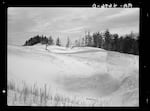Frank Herbert’s epic 1965 science fiction novel Dune tells the story of a future civilization fighting to control precious resources on a harsh desert planet. The book has been praised as the first major ecological science fiction novel and spawned decades of subsequent novels and on-screen adaptations. A major new film adaptation of Dune has just been released in theaters and on streaming platforms across the world.
But while the story of the clash of civilizations on the planet Arrakis is set in a time and a place far away, Herbert’s inspiration for the story came from a battle between man and nature in the rolling sand dunes of the Oregon coast.
In the early 20th century, the coastal Oregon city of Florence was under threat of being consumed by the nearby dunes that were being whipped across human structures by the coastal winds. Roads, railroad tracks, even homes were being swallowed up by blowing sand. Starting in the 1920′s, the US Department of Agriculture ran a program to try and stabilize the dunes by planting European Beach Grass. The hope was that its dense roots would hold the sand in place and prevent it from burying nearby cars and homes.

Resettlement workers are planting Holland grass to stop the moving sand dunes on the Oregon coast from inundating forest recreation areas at Lake Sutton, Oregon in 1936
Rothstein, Arthur
Herbert came to Florence in 1957, planning to write an article documenting this battle between man and nature. He was awestruck by the power of the blowing desert sand. As he wrote in a letter, “These waves can be every bit as devastating as a tidal wave in property damage.”
“Like you can tell from his books, he was interested in everything,” says Meg Spencer, District Director of the Siuslaw Public Library District. “He took a flight over the dunes, he took multiple photographs, he walked out onto them.”
Herbert finished his article on Florence, but it was never published. Instead, he began to dig deeper into desert ecosystems and human interactions with nature. “The experience here seeing the dunes — and the interaction between the people here and the environment they were living — that really did become the center of Dune and Arrakis,” says Spencer.
She knows this because the Siuslaw Public Library is home to an archive of many of the original materials that Herbert collected to research Dune. It includes books like “The Sociology of Nature,” a 1962 book on modern ecology, and “The Changing Nature of Man,” a book of historical psychology from 1961.
The collection also includes books on Marxism, poetry, ethics, and hypnosis.

A display of "Dune" memorabilia at the Siuslaw Public Library in October, 2021. The library is home to the Frank Herbert collection, an archive of materials Herbert referenced while writing the science fiction classic.
Siuslaw Public Library
“He was clearly reading across this huge breadth of titles,” says Spencer. “It’s so clear that he was trying to bring in psychology and religion; it’s fascinating to see all the sources he was pulling from to write this giant universe that became Dune.”
But it was the ecology of the desert he witnessed in Florence that most inspired Dune’s setting on Arrakis. “It’s easy to say he was prescient,” Spencer said, “but maybe it’s better to say he was far-sighted. He saw how that interaction between people and the environment could result in chaos and unintended consequences.”
Dune tells the story of a civilization struggling to balance their relationship with an unforgiving natural world, and the unintended consequences of their actions. Ironically, that same struggle is playing out today on the sand dunes of Florence. The efforts to plant European beach grass did manage to hold the dunes in place, “but what they discovered is that the beach grass is also an invasive species,” Spencer says. “The amount of land that is the sand dunes has decreased and decreased, year by year.”
“It’s a perfect example of the unintended consequences you see in Dune,” Spencer says. “Now there’s a lot of work being done to remediate that, to allow humans to go on living here successfully and having roads and buildings, but also trying to make sure that we save this incredibly special gem that we have.”
Still, the sand dunes of the Oregon coast retain the majesty that inspired Frank Herbert more than 60 years ago. Spencer says she feels the alien landscape of Dune every time she visits.
“Walking out on those dunes, spending time on them, is the thing you see throughout the book and throughout the adaptations… that feeling of sand that goes on forever and is un-tameable,” Spencer says.
In fact, she says the similarities can be so uncanny, she superstitiously takes steps not to attract the attention of sandworms: the giant fictional creatures living beneath the sands of Arrakis.
“Even to this day, I start thinking about ‘oh, are my steps too regular?’” she laughs.
Listen to Spencer’s conversation with OPB’s John Notarianni using the audio player above
The Siuslaw Public Library and City Lights Cinemas in Florence are hosting a series of events commemorating Frank Herbert’s Dune. More information available here.
• Saturday, Oct. 23rd @ 3:30 p.m.: A screening of Dune with a presentation by the Oregon Dunes Restoration Collaborative
• Sunday, Oct. 24th @ 3:30 p.m.: A screening of Dune with a discussion of how the book compares to its film adaptations
• Thursday, Nov. 4th @ 10:30 a.m.: An online book club discussing the themes and meaning of Dune with the Siuslaw Public Library
• All month: See rare items from the Frank Herbert collection, from books, film memorabilia, and art, all of which were donated to the Siuslaw Public Library District by Herbert’s family. See displays at both the Florence branch, as well as City Lights Cinemas.
Editor’s note: We’ve updated this story to clarify Florence’s position on the central Oregon coast.
